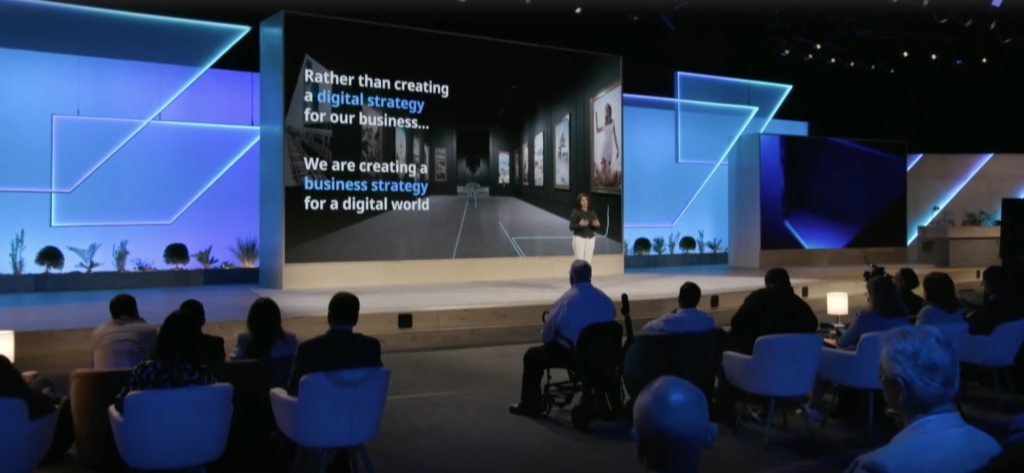At SAP Sapphire back in May, Lidia Fonseca, Chief Digital and Technology Officer at Pfizer, delivered a keynote presentation explaining the value of being a trading partner on SAP Business Network. She provided many great insights, which I’ll highlight in a moment, but let me begin with how she concluded her presentation:
“At Pfizer, rather than creating a digital strategy for our business, we’re creating a business strategy for a digital world.”

I love that statement because at first glance the difference between the two approaches is not clear, but the more you think about it and unpack it, you realize there is a big difference.
For more than a decade, analysts, consultants, and technology companies have been preaching the need for companies to develop a digital transformation strategy. It’s true that many companies still rely on manual, paper-based processes to manage parts of their supply chain. Many more rely on sending emails with spreadsheets attached, back and forth, to a long list of people. In short, from a technology standpoint, many companies are running their supply chains in 2023 like it’s still 1999. So, yes, moving up the digital maturity curve is very important.
However, technology does not exist in isolation. Its ultimate role and purpose is to help companies execute their business strategy. In other words, a company’s business strategy (which involves much more than technology) is what should define and inform its digital strategy, not the other way around.
The way I interpret Fonseca’s comment is that Pfizer didn’t start by asking “What should our digital strategy be?” Instead, the company first asked, “What changes, if any, do we need to make to our business strategy to remain a leader in the market moving forward?” The answer to that question is what’s guiding Pfizer’s digital strategy, and SAP Business Network is a critical component of it.
Pfizer is on a single instance of SAP covering 100% of its revenue across 149 markets, 31 plants, and more than 83,000 colleagues running hundreds of millions of transactions across learning, procurement, manufacturing and customer ordering.
“Digital data and AI are critical to our success,” said Fonseca. “What differentiates Pfizer is that we apply this across the entire company, and we’re doing it quickly and at scale using leading-edge digital capabilities and standard platforms to bring medicines to patients faster.”
“SAP Business Network helps us scale transactions and collaborate across our entire supply chain,” Fonseca added. “We have automated 90 million transactions, enabling our colleagues to focus on what matters most.”
“As you can imagine, our product supply chain includes numerous raw materials, contract manufacturers, and distributors,” said Fonseca. “So, digital trading partner collaboration is critically, critically important. SAP Business Network will help us share key data across our supply chain that enables us to deliver medicines faster.”
It all boils down to this: SAP Business Network is helping Pfizer scale its operations quickly and cost-effectively, and bring products to market faster, by automating business processes, facilitating data sharing and collaboration with trading partners, and enabling employees to focus on value-added work instead of mundane, repetitive tasks.
Henkel
“I’m old enough to remember when we used to write purchase orders and give it to the back office and they would type it up and fax it to suppliers,” recalled Nilesh Mhatre, CIO of Americas & IMEA at Henkel AG & Co. “It would take 3 days for the PO to reach the vendor.”

That was back in the late 1990s. Today, the company is on the forefront of driving change and innovation. Henkel and SAP have been working together for decades, and in April 2023, Henkel announced that the two companies have “teamed up to drive digital co-innovation by leveraging a unique combination of future-ready software, technology, and ecosystem, to further boost Henkel’s digital transformation journey.”
“Digital transformation is one of the key levers [along with innovation and sustainability] on our agenda for purposeful growth,” said Mhatre. “That means continuing to innovate with our trading partners, vendors, and suppliers around the world is going to be key.”
This is where SAP Business Network comes into play. “Business networks help us ensure that our global supply chains for each of our business units [Henkel has manufacturing facilities in more than 160 locations and 56 countries] are well prepared for market shifts and demand fluctuations.”
One of the key ways Henkel is using SAP Business Network is for Finance Collaboration with its suppliers. The capabilities available on the network are powered by Taulia, which SAP acquired in May 2022, and they provide users with a variety benefits:
- Secure early payment discounts
- Provide suppliers with third-party funding
- Obtain receivables financing from unpaid invoices
- Improve inventory visibility and reduce lead times
- Incentivize suppliers to participate in sustainability initiatives
The last point is particularly important to Henkel. As mentioned earlier, sustainability is one of the key levers on its agenda for growth, and the company aims to achieve 100 million tons of CO2 reductions together with customers, consumers, and suppliers between 2016 and 2025.
Mhatre highlighted how they are providing flexible financing options to their suppliers with preferential rates depending on suppliers’ ESG ratings. “As suppliers improve their ESG ratings, they pay less interest, but it also benefits us because we have more sustainable vendors to support our [sustainability goals],” explained Mhatre. “These capabilities allow organizations to offer financing to stimulate sustainability in the supply base and help take care of our planet.”
Henkel is also leveraging the SAP Business Network for Procurement Collaboration, and looking ahead, “We are now looking to do more with SAP Business Network and look forward to achieving additional efficiencies and benefits,” says Mhatre.
Final Thoughts
I’ve been writing about the value of business networks since 2003 when I wrote a paper on Supply Chain Operating Networks. At the time, very few people understood or cared about the topic. Educating the market on the role and benefits of what many in the industry now call “business networks” has been a long journey, and the education process continues. The good news is that more and more customer case studies are emerging, and nothing is more powerful in getting companies to think and act differently than listening to industry leaders like Pfizer and Henkel share their success stories.
It’s clear that the significant problems and opportunities we face today in the supply chain and logistics industry — including labor constraints, sustainability, and more stringent customer requirements — cannot be solved or realized using the same level of thinking, the same technologies, and the same processes we have used in the past. Collaboration, especially with external trading partners, is no longer an option; it is imperative to effectively address these challenges and opportunities. As Pfizer and Henkel show us, the platform for driving change and innovation moving forward is a connected business network.











